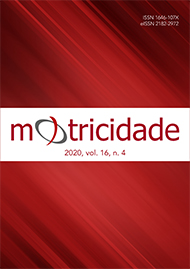Adaptation of the Aquatic Functional Assessment Scale for Babies - AFAS BABY©
Escala de Avaliação Funcional Aquática para Bebês
DOI:
https://doi.org/10.6063/motricidade.20396Resumen
Despite the increasing use of the aquatic environment (AE) as a therapeutic option for activities with infants and toddlers and the increasing number of assessment instruments for land-based physical therapy, no instrument addresses the characteristics of the aquatic environment regarding babies. This study aimed to adapt the aquatic behaviors of the Aquatic Functional Assessment Scale (AFAS) for babies, encompassing infants and toddlers aged three to 24 months (AFAS-Baby). First, a child was observed in the AE by two experts, with adjustments being made by three professionals with experience in the scale. Second, 5 children were evaluated to verify both the scale's applicability and the need for adjustments in it. Lastly, 6 professionals/experts validated the content of the scale. Hence, the AFAS-Baby comprises 61 behaviors: 8 in the Adaptation (A) phase, 14 in Mastering of the water environment (D), 35 in Specialized Therapeutic Exercises (E), and 4 in Global fitness (Cd). The score remained unchanged, following the original scale. The AFAS-Baby enables the assessment of specific aquatic motor behaviors for infants and toddlers, as well as assists professionals in the aquatic stimulation of babies.
Publicado
Número
Sección
Licencia
The authors of submitted manuscripts must transfer the full copyright to Journal Motricidade / Sílabas Didáticas Editions. Granting copyright permission allows the publication and dissemination of the article in printed or electronic formats, and copyrights start at the moment the manuscript is accepted for publication. It also allows Journal Motricidade to use and commercialise the article in terms of licensing, lending or selling its content to indexation/abstracts databases and other entities.
According to the terms of the Creative Commons licence, authors may reproduce a reasonable number of copies for personal or professional purposes, but without any economic gain. SHERPA/RoMEO allows authors to post a final digital copy (post-printing version) of the article on their websites or on their institutions' scientific repository.


